How does a woman become a mother? Is it by giving birth to a child? Or, can a woman become a mother y adopting, fostering and loving a child birthed by another?
Dr Vithal Venkatesh Kamat said – A child gives birth to a mother. So, perhaps it would be prudent to describe a mother as a woman who is born when a baby comes into her life. She is an embodiment of selfless love. Isn’t that what motherhood is all about?
Undisputedly, the worst outcome of the covid -19 pandemic has been the unmitigated loss of life. Families have been destroyed, leaving the survivors shocked, financially insecure and often even destitute. But, the destruction does not stop at humans. Courtesy some shoddy media reporting labelling animals as carriers of the covid-19 virus, people have abandoned pets for fear of contracting the corona virus. This has only added to the massive Indie stray dog and cat population on our roads.
However, it is in these unprecedented times, that women have emerged as harbingers of change. They have stepped forth and opened their hearts and homes to abandoned pets and stray animals by providing a safe sanctuary to them and by adopting and fostering them. Thanks to these women, a lot of strays that would have otherwise starved on the road due to lack of food or died due to maladies, have found loving homes.
One such woman is Nidi Hegde, a fashion designer and an animal rights activist from Mumbai.
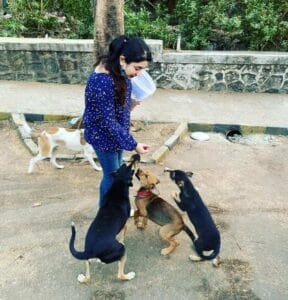
Nidi mothers scores of strays in Lokhandwala apart from the rescues that she mothers at home. Nidi and her band of dog feeders not just feed the strays but also undertake their medical expenditure, vaccination and de-worming responsibility. Come rain or sunshine, they are out on the roads, twice a day ensuring that no stray baby goes hungry. Even during the lockdown in 2020, Nidi regardless of her safety, dutifully ferried injured animals to the vet for treatment. That is selfless love, isn’t it, the kind that defines a mother?
‘I have 7 rescues – 2 dogs and 5 cats out of which 2 are special needs. Most are adoption failures because even after I rescued and nursed them to health, people did not want to adopt them. The situation has worsened during the pandemic. Unsubstantiated press reporting has led to many people abandoning their pets. Some have ended up in shelters while others have perished on the road, unable to bear the trauma of separation. Uprooted from their homes, they have died scared, hungry and alone.’
Nidi’s heart breaks at the plight of these animals and the apathy that they face at human hands. She is a passionate advocate for the rights of these babies who cannot speak for themselves.
‘The pandemic has compounded the situation. If the animal happens to come from a family that is affected by covid-19, the infected humans get help but the pets, in this situation, are often neglected. Some are stranded without food and water, all alone at home. Some are outright abandoned. The death of the owner, in many cases, effectively puts a pause to the pet’s life with the family. The more humane families leave the pet at a shelter. But, there are those who simply abandon them on the road and justify their stance by saying – ‘It is an animal. It knows how to fend for itself on the street’. But, with no restaurants open and no handouts in the trash, animals are starving and dying an agonizing death. It burns my blood to see that we humans have forgotten that as a species, we need to coexist and live, love and serve!’
Nidi’s thoughts find resonance in the heart of Kolkata based Sreemati Sen, a social worker and a mother of two kids.
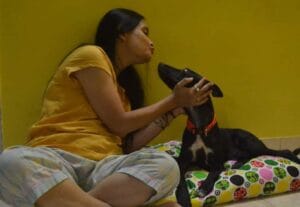
In July 20, amid the pandemic, Sreemati welcomed her third child Khoi, an Indie breed, part of a litter of four puppies that were abandoned in a drain.
‘We took the decision to adopt Khoi because we realized that as an Indie breed she would probably never get adopted and would live on the streets her whole life. I was reluctant to adopt a female pup since I knew little about managing their menstrual cycles. But, my 12 year old son told me that statistically the data w.r.t the abandonment of female pups was staggering. Even if by a miracle one of the four pups got adopted, it would most assuredly not be the female. That changed my perspective. And, Khoi came home.’
When Sreemati brought Khoi home, she experienced the same joy as she had when she had brought her son and daughter home from the hospital after their birth. But, sadly, the trauma of life on the streets was deeply imprinted on the little pup’s mind. It took love and patience from the family to bring Khoi out of her petrified state.
‘Cradled in my lap, a week after we first saw her, we brought Khoi home. The petrified pup found a corner in the kid’s room and refused to budge from there. For three days she neither pooped nor ate well, driving us all into panic. If we tried to take her out, she would shiver, whimper and hide. The sight of men made her shake with fear for probably such was the trauma that she had borne on the street. For a long time, the sight of our car made her throw up, possibly because she thought that she would be abandoned again.’
Khoi was adopted when Sreemati’s family was battling a tough phase. The lockdown had kept Sreemati’s husband away in Bangalore and they had not met him for eight months. It was during this phase that Khoi was adopted and she brought a new meaning to their life. All of a sudden the house brimmed with energy and positivity.
‘My new child is at times my little baby demanding a cuddle and a kiss. At times, she is the big sister who takes a casual stroll monitoring the children and reporting back to me. She can also be the introspective grandmother who prefers a quiet evening to herself with her biscuits in the balcony. Somehow, I don’t think we rescued her. It was the other way round. She rescued and revived us. She made me a mother again.’
Sreemati and Nidi are not isolated in thinking of their pets as their babies. Another Mumbai resident, Itika Sekhri, an educationist by profession, agrees.
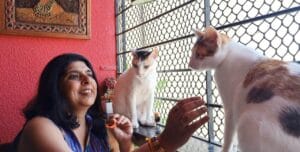
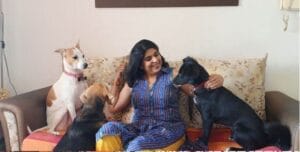
Itika already was a mother to a pet Beagle (apart from her two lovely daughters) when her rescued pets came into her life.
‘I adopted our dog Noorie, our black furry baby, in December 20 during the pandemic when we observed her crying pitifully by a tea stall near our home. Initially, the tea shall owner took care of her but after some time he found it difficult to tend to her. That’s when I opened my home to her. Similarly, I adopted Shiela, our white furry baby when we found her abandoned in the rains. To me taking them in was not a choice. I am a mother, aren’t I? Would I ever abandon my child like that? NO – I would not. So, how could I abandon these furry babies? As a mother I just couldn’t leave them motherless. I had to bring them home.’
Itika raises some pertinent questions. For her, adopting the furry babies was not an act of charity. It was a decision that came from the heart of a mother. And, the dogs are not the only animals that Itika has given a new life to. Zoey, her cat was rescued from the streets after she was attacked by a Tomcat and left injured. Similarly, Laila, Itika’s second cat was brought home after the kitten was abandoned by her biological mother during the rains. Over the past few years, Itika’s family of five members has lovingly nurtured the new fosters, as their brood has grown. Today, Itika has a family of 10 members – 5 humans and 5 pets (who are like her children).
‘Each one of my pets has their own identity at home. Just as I know about my daughters; I know my furry babies’ mood swings, habits, idiosyncrasies, and likes and dislikes. I know what makes them happy or what annoys them. All my pets are house and toilet trained and that was a united family effort. My family has been a huge support and we all happily take care of them. The love that these animal babies have brought to our lives is unmatched. I would say that it is not us who chose them, it is they who chose us and I thank them every day for the bliss that they bring to our lives. I am fortune for I had the opportunity to become a mother seven times over.’
Itika’s joy is evident in the warmth that seeps into her tone as she speaks about her babies. And, that is reciprocated by Preeti Warrier, a professor in an Engineering College in Mumbai.
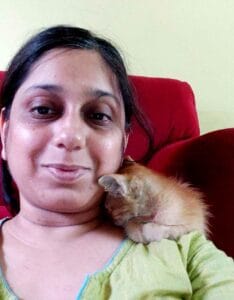
In May 2021 Preethi rescued and adopted an injured kitten that was still nursing.
‘Sumitro, my kitten, was bitten and deeply wounded when I found it. One look at it and I knew that I had a new baby in the family. I could not leave it to die. I brought it home and nursed it back to health and my family helped. I have a chart for Sumitro’s food, milk and medication and since he is so tiny, I have to keep to a hand-feeding schedule. It reminds me of the time when my son was that young. With this kitten I am enjoying all those moments of motherhood again. But, thankfully, unlike the first time, this time my new baby got toilet-trained in half a day. Phew, quite a relief that was.’
Preethi like many mothers is concerned about the well-being of her kitten. She monitors not just the nutritive intake of her baby but also tries to keep the kitten happy with play and some light exercise. Her kitten plays with soft toys and she makes paper balls for the kitten to chase so that he can stretch his recovering limbs.
‘At my mother’s house, many years ago, we used to feed a cat in the building. One day we found her gravelly injured and adopted her. We nursed her back to health. It saddens me to say this, but our gesture for the innocent animal did not sit well with the building residents. A meeting was called against our family and we were accused of creating nuisance. To our horror we learnt that it was some ill-meaning residents who had attacked and tried to kill the poor cat. It was only when I threatened to register a complaint to the police that things quietened down.’
Preethi feels that it is okay if someone doesn’t like animals but, it is not okay to harm them intentionally. That is a criminal act. She questions – ‘If someone does not want to feed the hungry then why hinder those who genuinely care for them? What perverse purpose does that serve?’
These feisty women show us that motherhood is indeed not biological. They collectively opine that as the dominant species on Earth it is our responsibility to shield and protect the less fortunate ones. By opening their hearts and homes to strays they exhibit that our planet is home not just to us, humans, but also to the billions of species that evolved along with us. We may not be able to stop all the atrocities that are meted out to these innocent, helpless animals. But, together, we can surely ensure that we take every opportunity to not just care for these animals but also educate others to curb their aberrant and hateful behavior towards them.
As these empathetic women have shown, the change perhaps needs to come from the heart of us mothers. Maybe, we can be the wave that starts a revolution and changes the human attitude towards stray animals. It is much needed, especially during this pandemic, is it not?
 Sonal Singh On Sonal's Table
Sonal Singh On Sonal's Table


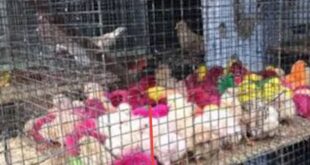

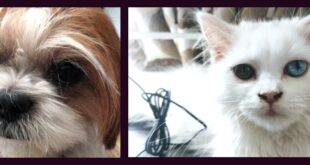
A heart warming article in these cold covid times. Hats off to these and many more like them.
Thank you for reading it.